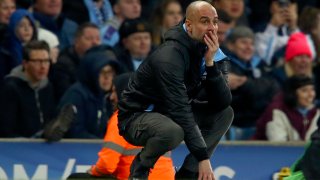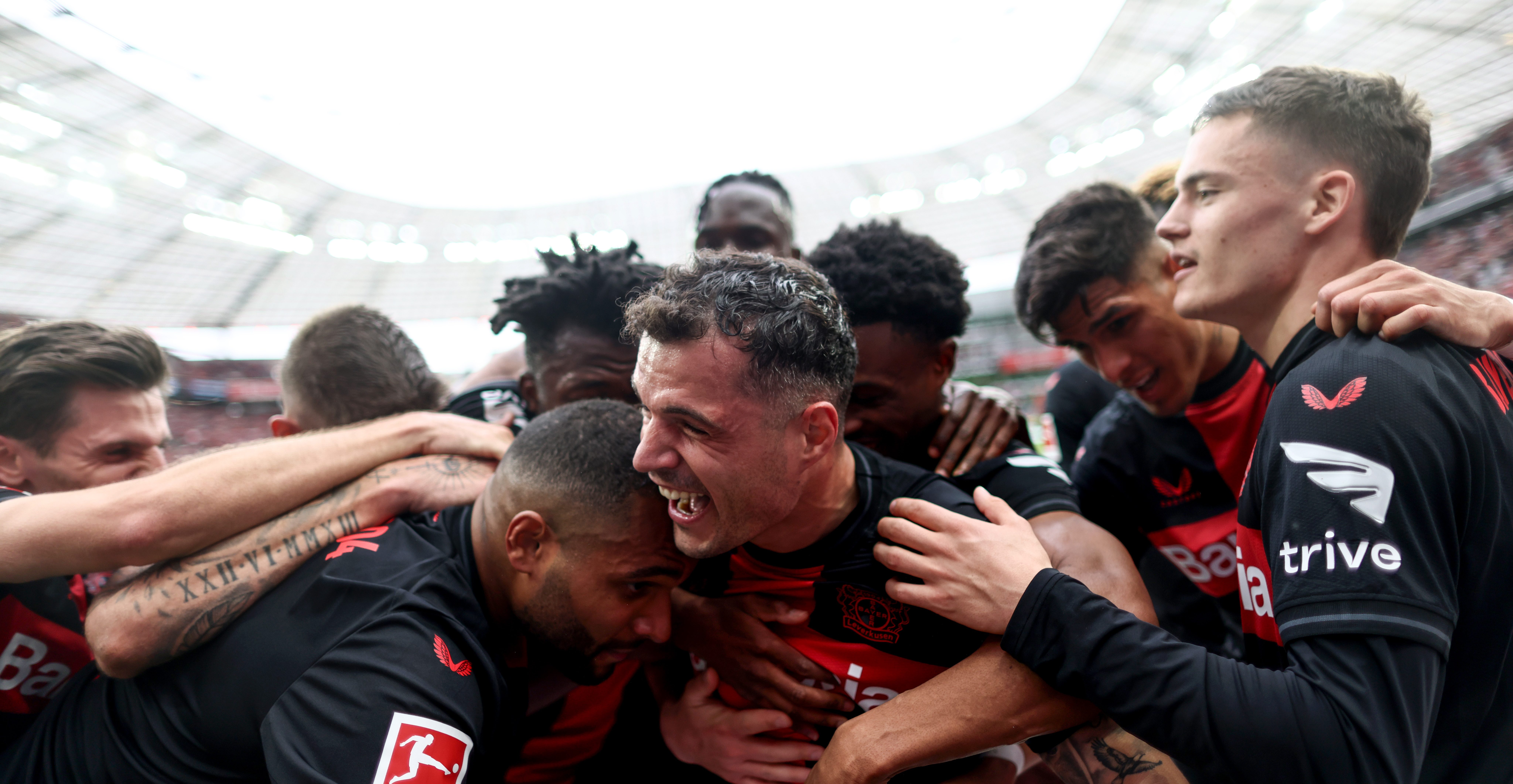
Manchester City have never won the UEFA Champions League, and manager Pep Guardiola hasn't lifted a European cup since leaving FC Barcelona in 2012.
What could be their best -- and last -- chance to do so together is up in the air.
UEFA intends to finish its Champions League and Europa League campaigns, but the uncertainty stemming from the coronavirus (COVID-19) pandemic looms large over the world’s most prestigious club competition, to say nothing of the resumption of the Premier League and domestic campaigns around the globe.
Stay in the game with the latest updates on your beloved Bay Area and California sports teams! Sign up here for our All Access Daily newsletter.
Twelve teams remain in the Champions League, but City's forthcoming multi-year ban from European competition due to Financial Fair Play (FFP) violations means the English giants will face a unique pressure if the competition resumes.
That, however, is far from certain.
“We'll have to see what Champions League and European football sort of has going forward,” NBC Sports analyst Robbie Earle told NBC Sports Bay Area last month, “but I get the sense the domestic leagues are going to take precedence over any of the competitions.”
The elusive cup
Soccer
Few fans away from the blue side of Manchester will sympathize with City’s chase for a European crown. The Abu Dhabi-owned club have won every English trophy at least twice since Sheikh Mansour’s group purchased the team in 2008. Their domestic dominance reached new heights under Guardiola, as the Catalan has led City to eight trophies since 2016, including the last two Premier League titles.
It hasn’t translated to Europe. City never have made it to a Champions League Final, and Guardiola only has steered them as far as the quarter-final. Guardiola hasn’t managed a Champions League finalist since leaving Barcelona, either.
Manchester City were 25 points back of Premier League leaders Liverpool at the time of the English season’s suspension, but up 2-1 -- with an away-goals tiebreaker -- after the first leg of their Champions League Round of 16 tie with Real Madrid in February. City’s domestic deficit would’ve worked in their favor, according to Earle.
“Obviously no Premier League to focus on is disappointing from their point of view,” he said. “But in some ways (it) frees Pep up from here on in to concentrate on those midweek games and make sure his best teams are all fit and ready for those.”
City’s dominance on Premier League pitches (plus-39.1 expected-goals differential, according to StatsBomb) didn’t always translate to results, but it did in Europe this season. Only Bayern Munich has posted a better expected-goals difference (plus-17) than City (plus-12.8) in the Champions League, and the Sky Blues are yet to lose a match in the competition this season.
Their path through the knockout stages also started to crystalize. French giants Paris Saint-Germain secured quarter-finals qualification, but Liverpool already had been eliminated by Atlético Madrid at the time of the Champions League’s suspension, and Juventus trailed Lyon heading into the second leg of the Round of 16.
Newcomers Atalanta and RB Leipzig already had advanced, while Barcelona only led Napoli on away goals heading into the second leg. Bayern’s dominance aside, a favorable draw likely would have awaited City in the quarter-final.
“[With some teams] aging out, some stars not quite on top of their game,” Earle continued. “I just felt that City -- if they could produce two or three big days when (it) was necessary -- could go on and win it this time.”
Experts agree that games for the remainder of the season must occur in empty stadiums, like the City of Manchester Stadium pictured above. That's not the only precaution UEFA will need to take in order to restart the Champions League. (Image courtesy: AP Photo)
UEFA Uncertainty
Hours after UEFA issued a May 25 deadline for domestic leagues to announce their plans for the remainder of their seasons, Europe’s biggest domino to date fell.
French prime minister Edouard Philippe announced last Tuesday that the Ligue 1 and Ligue 2 seasons will not resume, and sporting events -- even those behind closed doors -- are banned until September. Both leagues officially canceled their seasons two days later as a result, though Ligue 1 winners PSG said they intended to remain in the Champions League.
UEFA had its work cut out for them prior to the French season’s cancellation, but they reportedly shifted gears as a result. The governing body, according to The Guardian, now are considering playing behind closed doors at neutral stadiums. They reportedly were working on plans that would allow the Champions League Final to occur on Aug. 29 in Istanbul, Turkey prior to Ligue 1's cancellation.
Completing the competition at that time is feasible, according to two medical experts who spoke with NBC Sports Bay Area, albeit under very specific conditions designed to minimize the risk of the virus’ spread.
For one, that means holding all games in a central location in order to reduce travel. For another, teams and support personnel would need to self-isolate for up to two weeks upon arrival and before starting to train.
“So by moving people to a central site, you actually can control who goes in and who goes out,” said Dr. Dean Winslow, a professor of medicine at Stanford University Medical Center who specializes in infectious disease.
“Of course, it presupposes that you have access to adequate numbers of sensitive RNA virus tests to actually make sure people are not contagious before you allow them sort of in close proximity to each other, for either workouts or for competition.”
UEFA, which held multiple empty-stadium Champions League and Europa League matches prior to suspending both seasons, reportedly intends to introduce controls similar to proposed measures in Germany. The Bundesliga and Bundesliga 2 are preparing for a May restart -- barring government approval on Wednesday -- with regular testing of players and personnel. The plan, as laid out by German football officials, wouldn’t strain the company’s existing testing capacity and includes barring fans while limiting stadium capacity to just over 300 people.
Dr. Arthur Reingold, an infectious disease expert and the head of epidemiology and biostatistics at UC Berkeley, said success of any such plan minimizing risk of the virus’ spread would “depend on the details.” But there is only so much UEFA -- or any other sporting body -- can do while the coronavirus continues to spread.
“[If] the virus is still circulating this summer,” Reingold explained, “which I think virtually all experts in the field think is likely, then there is that risk. It's very hard to quantify the risk, and figuring out exactly what measures can assure safety, or at least give a high level of safety, is part of the challenge."
Other hurdles remain. Of the European leagues with teams still competing in the Champions League, Ligue 1 is the only one with a completed season following Thursday’s cancellation. The Bundesliga, Spain’s La Liga, the Premier League and Italy’s Serie A all, to varying degrees, are working on plans to resume their seasons.
The window in which domestic competitions could end with enough time to conclude the Champions League by September -- UEFA president Aleksander Ceferin’s stated goal -- becomes narrower by the day. Numerous player contracts expiring on June 30 opens countless cans of worms, and players in England and Spain have expressed reservations about resuming seasons while the coronavirus remains a threat.
The totality of these challenges, and the potential knock-on effects for a sport already facing a disrupted calendar with the European championships pushed back to 2021 and a winter World Cup in 2022, is steep. There’s a real chance the Champions League concludes without a winner.
Manchester City's Champions League future beyond this season arguably is even murkier. Image courtesy: AP Photo
‘Elephant in the room’
Manchester City wouldn’t just rue a canceled Champions League campaign as a missed chance at European glory. It could be the first of three.
“It will be disappointing for certain teams,” Earle said of a potential cancellation. “And certainly Man City are a really interesting one because the one sort of elephant in the room that is still there for City is this ban that hangs over them in terms of their Financial Fair Play (FFP), and possibly having to miss two European seasons.”
UEFA banned City from competing in all European competitions for the 2020-21 and 2021-22 campaigns and fined them £25 million after determining the club misled investigators and inflated sponsorship revenue in order to break even under FFP regulations. Emails leaked to German outlet Der Spiegel showed Abu Dhabi United Group -- Sheikh Mansour’s private-equity company -- covered nearly £60 million of Eithad Airways' listed £67.5 million sponsorship.
City appealed the ruling to the Court of Arbitration for Sport (CAS), and the club say they have “comprehensive body of irrefutable evidence in support of its” innocence. Guardiola backed the club in an interview with Sky Sports days after UEFA’s ruling.
“If they don’t sack me … I will stay here,” Guardiola said at the time. “A hundred percent, more than ever. First, because I want to stay, not because it’s something special. … I’ve said before, I say now and I will say until the end of my contract: I want to stay. I want to help the club, to continue to help them -- if it’s possible -- to maintain this level as long as possible.”
Guardiola’s contract expires just over a year from now, which would take him through the first of the two-season ban. The Catalan manager insisted in February his players were committed to the club despite the ban, but one of City’s stars intimated last week that a two-year ban could cause players to look elsewhere.
Kevin De Bruyne, who’s on track to lead the Premier League in assists for the third time in the last four seasons, told Belgian outlet HLN that two seasons out of Europe would be “a long time.” He’s “waiting to see” what happens with regards to City’s ban, but De Bruyne admitted his future isn’t tied to Guardiola’s.
"I think Pep said he will see out the last year [of his contract] anyway no matter what,” De Bruyne told HLN (translation via Goal). “Then his contract ends. But I'm not going to let my decision depend on what Pep is doing.”
De Bruyne will turn 29 in July, and eight of City’s 12 outfield players to play at least 1,800 minutes this season are at least 28 years old. Fernandinho, who just turned 35, inked a one-year extension, but will other players approaching (or in) the end of their primes tolerate a two-year ban from European competition?
City have the financial wherewithal to replace anyone in the changing room, but the next three years likely would include this core’s last chance at rounding out the trophy case due to their ages. Learning their fate ahead of an already uncertain summer transfer window would help City and Guardiola adjust course as necessary this summer, but a speedy resolution doesn’t seem likely.
The CAS didn’t list City’s appeal on its docket of cases for May and June.
An upheld ban, even partially so, would hit City harder if it followed up a canceled European season, let alone elimination from a rebooted one. And as long as City’s immediate Champions League future is uncertain, the “elephant in the room” Earle spoke of will firmly be planted there.




